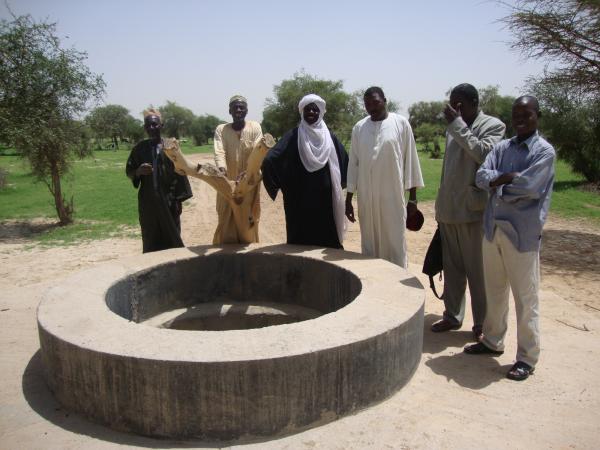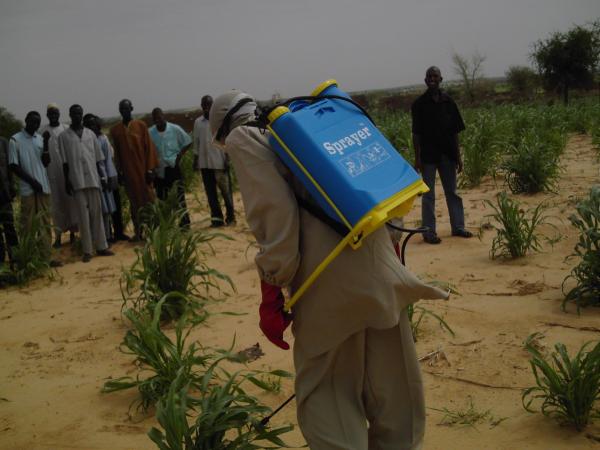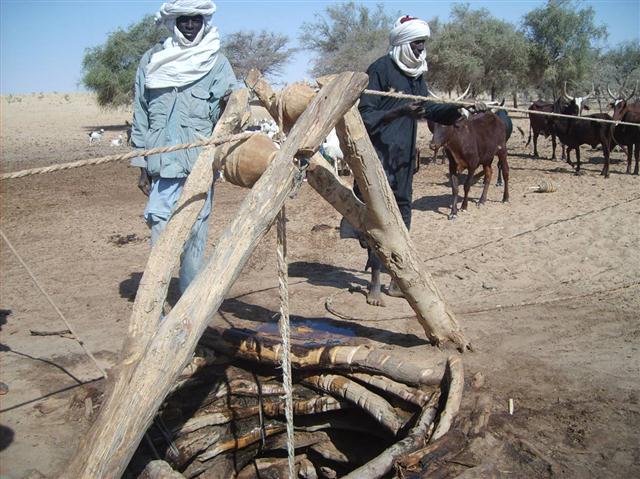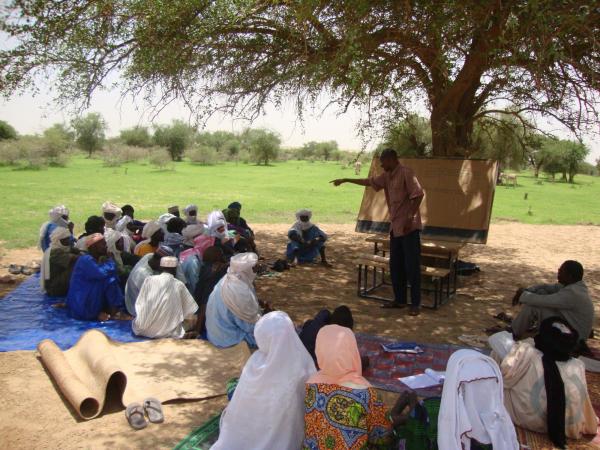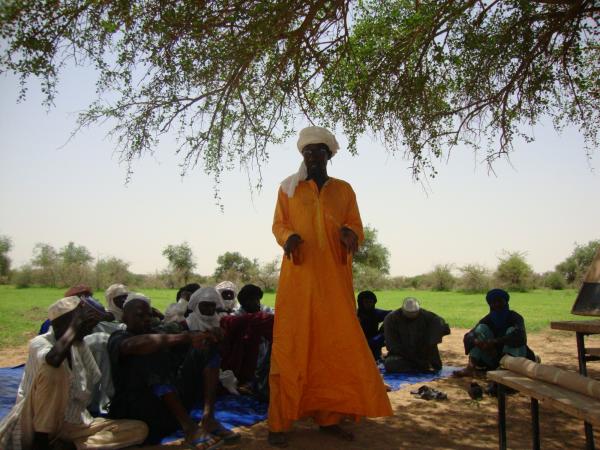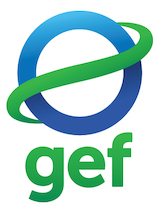CBA Niger: Adapting Pastoral and Agricultural Practices to the Realities of Climate Change (AGIR)
Project Overview
In the village of Rombou in the Maradi region of central Niger, both pastoralists and farmers now depend on increasingly scarce natural resources for their livelihoods. Plagued by high levels of poverty and structural food insecurity, the area suffers from unsustainable agro-pastoral practices and increasing risks of conflicts over natural resources. Climate change experts expect Niger to experience increasingly variable rainfall patterns and higher temperatures over the coming decades. Frequent droughts are already a problem, as rainfall levels have steadily declined since the late 1960s, resulting in an extended dry season that now lasts for nine months. The degradation of the Tarka Valley ecosystem has forced some residents into unsustainable and destructive practices, such as cutting firewood for sale, which exacerbate problems further.
Working with three communities consisting of about 6,000 people, this Community-Based Adaptation project will involve 2,000 participants in activities that promote more sustainable agricultural and pastoral practices, helping the population deal with predicted climate changes. It aims to foster sustainable water management, agricultural, and pastoral practices.
* This project is part of Niger's Community-Based Adaptation portfolio. *
Project Details
This project works with three villages of agro-pastoralists in Niger’s Sahel zone. Together, the three villages number approximately 1,600 people. The village is faced with high levels of poverty and structural food insecurity, which is exacerbated by soil degradation, dune mobilization and deforestation. Increasing levels of poverty have led local people to seek livelihoods by selling crop residues and wood cut from the Tarka valley – exacerbating soil degradation and thereby exacerbating poverty.
Furthermore, rainfall has declined by about 100mm in this region since the late 1960’s, from an average of about 400mm per year to about 300mm per year during the present decade. Ongoing climate change impacts will add to these pressures, increasing annual average aridity through increases in average temperature and evapotranspiration. In addition to changes in long-term average conditions, climate change is expected to increase the magnitude of inter-annual climate variability in the region. As climate conditions for agriculture and pastoralism worsen, crop failures are likely to increase (absent adaptation). These will likely lead to maladaptive coping strategies – including deforestation for the sale of fuelwood. Deforestation will increase erosion, which in turn will decrease the fertility of the area and make crop failure increasingly likely – fueling a cycle of poverty, vulnerability and land degradation that is propelled by the impacts of climate change. By restoring land (co-financing) and building capacity to sustainably farm it in a climate-resilient manner, the project will decrease the climate change threats facing land resources in the focal region
By restoring land (co-financing) and building capacity to sustainably farm it in a climate-resilient manner, the project will decrease the climate change threat facing land resources in the focal region. In response, the UNDP CBA project will build the capacity of the community to engage in livelihood practices that will contribute to the reduction of climate change-driven soil erosion pressures. Along with co-financing, measures will be piloted to restore degraded land by 25 hectares of degraded land restored, including 5 hectares of dunes. In addition, community members will be trained to implement and monitor land reclamation practices.
The CBA project will also fund activities to reduce deforestation and be more sustainable in the face of long-term climate change pressures by decreasing sustainable exploitation of natural ecosystems and replacing extensive agricultural practices with intensive practices. This will be achieved by instituting a community-managed bank of agricultural inputs, a quick-maturing seed demonstration, training for 15 community-level “brigadiers” to disseminate identified best practices in climate resilient agriculture locally, and the provision of agricultural implements to the most vulnerable households (less than 10 households, who would otherwise be forced to subsist on clime-stressed ecosystems). Lastly, lessons learned from project implementation will be integrated into local-level planning.
Key Results and Outputs
With co-financing assistance, traditional wells will be rehabilitated and grain/seed banks will be created to promote better-adapted and climate-resilient seeds, as well as to provide a buffer against food insecurity stemming from increasing climate variability.
The UNDP CBA project will protect water points against climate-driven siltation, erosion and desertification by planting trees around them. In addition, pilot projects on cultivated forage, dune fixation measures using hedgerows, and degraded land restoration measures will be undertaken in the Tarka valley to promote ecosystem resilience in the face of climate change.
The CBA project will also train community members in the implementation and monitoring of climate-resilient natural resource management practices. Lastly, lessons learned from project implementation will be integrated into local-level planning.
Reports and Publications
Brochures, Posters, Communications Products
Annual Reports
Project Brief / Fact Sheet
Multimedia
Monitoring and Evaluation
Monitoring and evaluation for community-based adaptation is a new field, and the CBA project is piloting innovative approaches to evaluating the success of locally-driven adaptation projects, and generating lessons to inform ongoing practice.
Key considerations in M&E for CBA include:
- Grounding M&E in the local context: M&E for CBA should avoid overly rigid frameworks, recognizing community heterogeneity and maintaining local relevance
- Capturing global lessons from local projects: CBA projects are highly contextualized, but lessons generated should be relevant to stakeholders globally
- Incorporation of both quantitative and qualitative indicators: to ground projects in tangible changes that can be objectively evaluated, and to capture lessons and case studies for global dissemination
To these ends, the CBA project uses three indicator systems: the Vulnerability Reduction Assessment, the Small Grants Programme Impact Assessment System, and the UNDP Climate Change Adaptation Indicator Framework.
The Vulnerability Reduction Assessment (VRA)
The VRA is a question-based approach with the following aims:
- To make M&E responsive to community priorities
- To use M&E to make projects more accountable to local priorities
- To make M&E capture community ideas and local knowledge
- To gather community-level feedback to guide ongoing project management
- To generate qualitative information
- To capture lessons on specific issues within community-based adaptation
- To generate case studies highlighting adaptation projects
The VRA follows UNDP's Adaptation Policy Framework, and is measured in a series of meetings with local community stakeholders. In these meetings, locally-tailored questions based on standard VRA questions/indicators are posed, and the community assigns a numerical score on a 1-10 scale for each question. Progress is evaluated through changes in scores over the course of implementation, as well as through qualitative data collected in community discussions surrounding the exercise.
UNDP has developed a Users Guide to the VRA (Espanol) (Francais) as a tool to assist practitioners to conceptualize and execute VRA measurements in the context of CBA projects.
The SGP Impact Assessment System (IAS)
The CBA, being a project of the GEF Strategic Priority on Adaptation, aims to increase the resilience of ecosystems and communities to the impacts of climate change, generating global environmental benefits, and increasing their resilience in the face of climate change impacts. To this end, the CBA projects use the SGP's impact assessment system for monitoring achievements in GEF focal areas (focusing primarily on biodiversity and sustainable land management).
The IAS is composed of a number of quantitative indicators which track biophysical ecosystem indicators, as well as policy impact, capacity development and awareness-building.
UNDP Climate Change Adaptation Indicator Framework
CBA projects also track quantitative indicators from UNDP's adaptation indicator framework, corresponding to the thematic area on natural resources management. More information on UNDP's indicator framework can be found on the UNDP climate change adaptation monitoring and evaluation website.
* This description applies to all projects implemented through UNDP's Community-Based Adaptation programme. Specific details on this project's M&E will be included here as they become available. *
